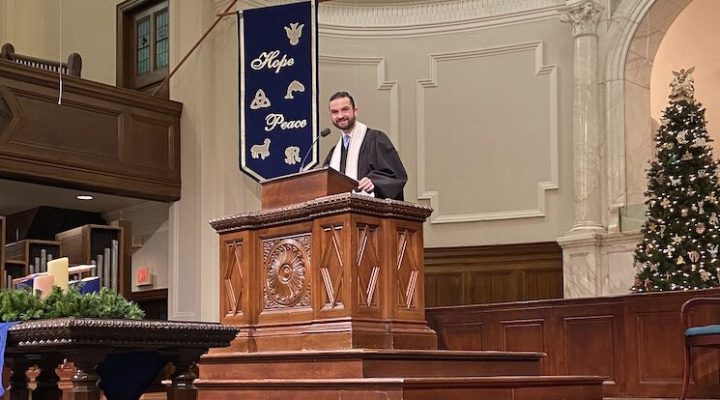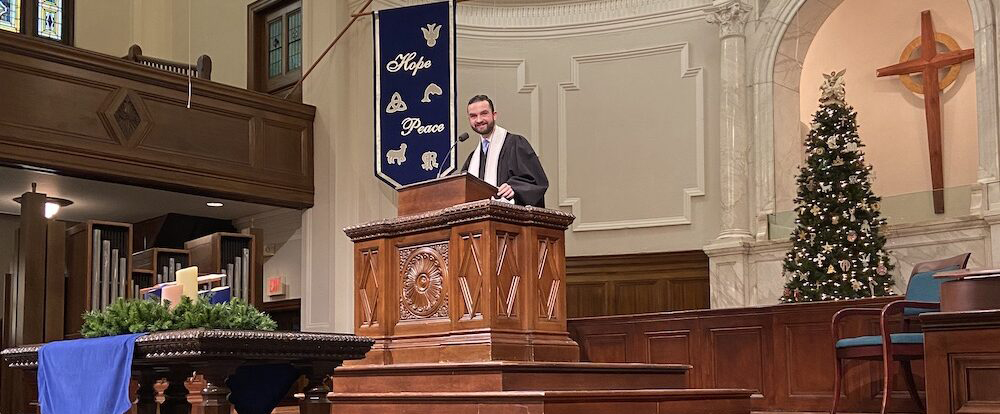Last Thursday, the U.S. House of Representatives passed the Respect for Marriage Act, providing federal protection for same-sex and interracial marriages. Outgoing Speaker Nancy Pelosi beamed on the House floor as she emphasized the importance of this legislation, the culmination of many years of “hard-work progress.”
Appropriately, this extraordinary bill passed during Advent, that season when our hearts, burdened as they are with the loads we carry, eventually give birth to hope in the form of a little child, clearing the path for a new way of being in our world.

Jordan Conley
It’s been a long Advent for many of us — some longer than others. Not long ago, I attended a meeting where colleagues who have been at this work much longer than I lamented the lack of progress they’ve seen over the years and how damn hard one must fight for even an inch of improvement in our society. It’s frustrating, and it’s enough to wear out anyone.
Yet (preachers always have a yet) as Pelosi spoke, it was clear to me that for her, and for all the LGBTQ activists who have worked and waited for years, the wait — the season of anticipation — was worth it in the end. Injustice may tempt our hearts to nihilism, but nothing undoes cynicism like new life in the form of a young child.
“Injustice may tempt our hearts to nihilism, but nothing undoes cynicism like new life in the form of a young child.”
On most Sundays, I have the privilege of preaching in the sanctuary where my husband and I were married. Honestly, it’s easy to feel guilty about that privilege. Although I had my own difficulty coming out as an evangelical college student, I’m well aware that as co-pastor, I am drinking from a well I did not dig, gathering from a vineyard I did not plant.
Even so, after President Biden signs this bill, I know there will be work ahead, especially in our churches. Many churches, even those open to LGBTQ folk in practice, have yet to fully come out as affirming faith communities. Many ministers and lay folk do not feel empowered by their faith to live as their authentic selves, even today. Besides this, one doesn’t have to go far beyond our LGBTQ community to find others within our world who continue to wait, and work, and then wait some more.
So this Advent, with the sails of the Respect for Marriage Act at my back, I’ll join my beloved congregants in singing, “O Come, O Come Emmanuel.” As we sing, we remind our hearts that Advent invites us to plant new vineyards, seek deserts of injustice and there, dig new wells. Advent reminds our wondering hearts that God clearly sees and delights in us. Who we are, where we are from or who we love does not dissuade the love of God, indeed as the Ethiopian eunuch found, it extends the bounds of the depths of God’s love.
“Advent reminds our wondering hearts that God clearly sees and delights in us.”
The love of God is practiced daily in marriage. My husband and I reflect God’s love in the commitments we have made to love one another for richer, for poorer, to love one another in the midst of sickness and in health, to practice the ethics of kin-dom living in our forgiveness and grace that we extend to each other and others. I see the divine within his heart each day, and I am a better son, brother and pastor because of our love.
In her closing remarks, Speaker Pelosi said, “Today, we stand up for the values the vast majority of Americans hold dear: a belief in the dignity, beauty, and divinity — spark of divinity, in every person.”
This Advent, may we celebrate new beginnings rooted in love even as we long, and wait, and work for the day when the world will acknowledge the spark of the divine in us all.
Jordan Conley serves as co-pastor of Crescent Hill Baptist Church in Louisville, Ky. He is a graduate of Baptist Seminary of Kentucky.
Related articles:
BJC leaders say religious liberty fears about Respect for Marriage Act are overdrawn
How to use ‘O Come, O Come, Emmanuel’ for daily reflection beginning Dec. 17 | Opinion by Beverly Howard


